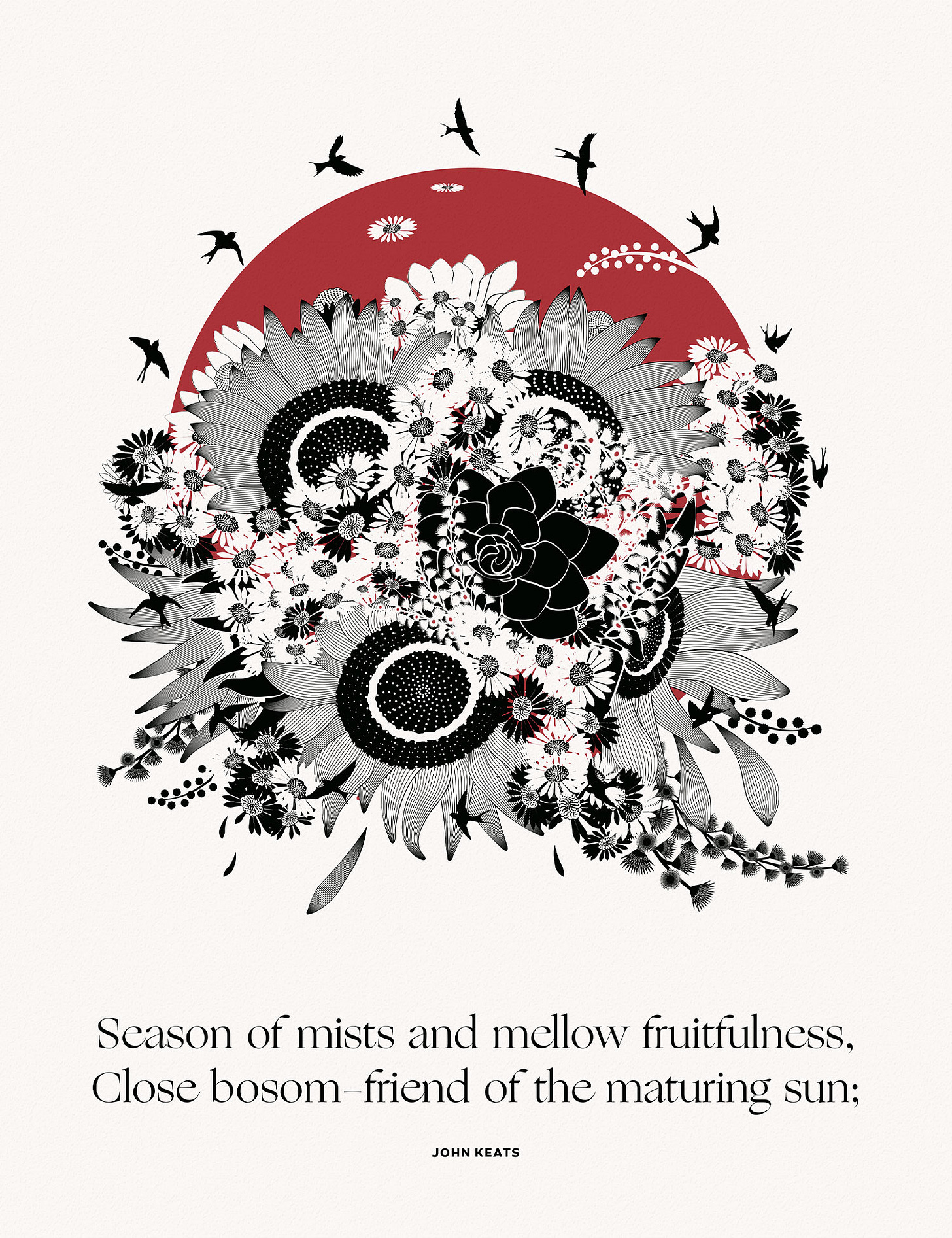
Keats on Autumn Before Pumpkin-Spiced Lattes
“Season of mists and mellow fruitfulness, Close bosom-friend of the maturing sun;" - John Keats
To Autumn by John Keats is one of those poetic treasures that suffers from its own success. You know it so well that you can’t quite hear it clearly anymore, like a classic Motown tune that has been on a few too many greatest hits compilations. But you know what? I Heard It Through the Grapevine is a masterpiece, and so is To Autumn. So while Keats has never been culture-jacked by a bunch of raisins, the raisins definitely wanted you to read more books of poetry (check ‘em out).
Because there is something particularly magical about the transition from summer to autumn, this poem strikes a chord with me every year. What is it about autumn’s approach that is so energizing? Sure, it’s partly a cultural thing - the return to school and work, the jackets and boots, the festivals and first fires. But there’s an aspect to autumn’s arrival that is more deeply ingrained than food and fashion; there are ancient impulses that whisper about harvest cycles and root cellars and gathering fuel - the same impulses that drive the birds, bees, vines, fruits and flowers of Keats’ poem. Those feelings go deeper than a venti pumpkin spice latte.
Despite its joy, the poem is pervaded by a certain fatalism (“until they think warm days will never cease,” “the last oozings,” “the soft-dying day”). It is no wonder. Keats himself had reached the end of his financial rope, and his ability to focus solely on poetry. In fact, To Autumn was one of the last poems he would compose; within months of completing it in 1819, the evidence of his tuberculosis would become fatally clear, and the slow, awful progression of the disease was likely already weighing on him as he wrote it.
Reading it with this in mind is almost too painful. Yet the poem bursts with a celebration of nature in its final, best glow. Even in the face of the finality of the winter that must follow it, the poem exhibits what Harold Bloom called “an acceptance of process beyond the possibility of grief.”
But for now, I’m just excited about the prospect of chilly weather, and I chose to celebrate the end of summer and abundance of early autumn with his opening lines. I am grateful for the turning of the seasons, for Keats’ beautiful and brilliant mind, and of course for the antibiotics that allow us to comfortably romanticize the lives of lost poets. I’d also like to rewatch Bright Star with Abbie Cornish and the extraordinary Ben Whishaw as Keats (also amazing as Richard II in The Hollow Crown series).
For my northern hemisphere peeps, what are your favorite aspects of the coming season? What are you most looking forward to this autumn?
Season of mists and mellow fruitfulness,
Close bosom-friend of the maturing sun;
Conspiring with him how to load and bless
With fruit the vines that round the thatch-eves run;
To bend with apples the moss'd cottage-trees,
And fill all fruit with ripeness to the core;
To swell the gourd, and plump the hazel shells
With a sweet kernel; to set budding more,
And still more, later flowers for the bees,
Until they think warm days will never cease,
For summer has o'er-brimm'd their clammy cells.
Who hath not seen thee oft amid thy store?
Sometimes whoever seeks abroad may find
Thee sitting careless on a granary floor,
Thy hair soft-lifted by the winnowing wind;
Or on a half-reap'd furrow sound asleep,
Drows'd with the fume of poppies, while thy hook
Spares the next swath and all its twined flowers:
And sometimes like a gleaner thou dost keep
Steady thy laden head across a brook;
Or by a cyder-press, with patient look,
Thou watchest the last oozings hours by hours.
Where are the songs of spring? Ay, Where are they?
Think not of them, thou hast thy music too,—
While barred clouds bloom the soft-dying day,
And touch the stubble-plains with rosy hue;
Then in a wailful choir the small gnats mourn
Among the river sallows, borne aloft
Or sinking as the light wind lives or dies;
And full-grown lambs loud bleat from hilly bourn;
Hedge-crickets sing; and now with treble soft
The red-breast whistles from a garden-croft;
And gathering swallows twitter in the skies.


